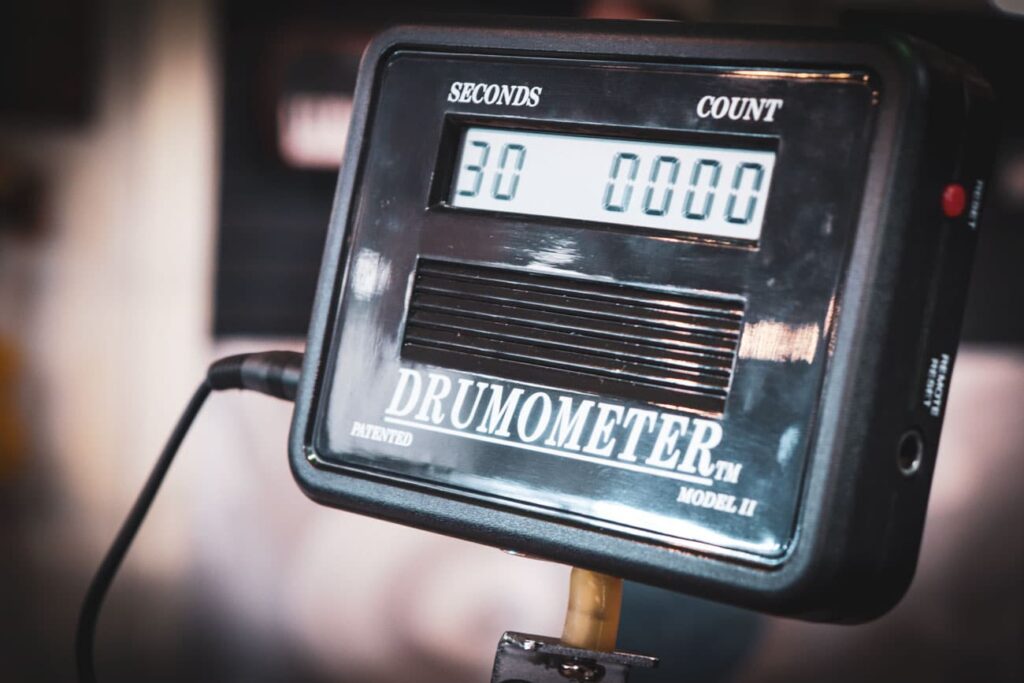4 Unique Drumming Tips That Actually Help You Play Better


Following a good list of drumming tips can aid you in practicing better, learning faster, and becoming a more skilled drummer.
After coming up with my ideas, I scoured the internet for other drumming tips from professionals, drum forums, other blogs, to create the ultimate repository of information.
1) Develop Good Practicing Habits
We’ve all heard the saying “practice makes perfect,” right? Not so much. Everyone out there says to practice often. But practicing with no intention can lead to negative results.
I had a professor who would always say, “perfect practice, makes perfect.” The adage implies always to have intent when practicing the drums.
I fell into this lousy practice habit often as a young drummer. I would continuously play along to my favorite Led Zeppelin and Rush songs for hours on end every night.
Was there anything wrong with doing so? No, but I wasn’t gaining anything by rehearsing the same songs over and over. My hands weren’t learning new stickings, and my feet weren’t improving at all.
Breaking this habit was tough, and I still find my self playing along to music more than I should these days.
What You Should Do
Stop playing the same songs over and over.
Listen to tons of different music — jazz, rock, pop, fusion; you name it.
Developing an extensive vocabulary of musical knowledge allows you to break from your comfort zone of playing. I know mine rests in 80s new wave and rock music from the 70s.
My first time discovering the Purdie Shuffle was like seeing the light part in the sky. I grew up with the music of Steely Dan and never realized the level of playing on those records.
This epiphany has changed my entire opinion on drumming, just as discovering Bonham and Peart changed my influence from 90s pop-punk drumming to older music.
2) Learn Alternating Stickings For Every Rudiment You Use
Something that’s been very advantageous to me was learning my favorite rudiments with both the left and right leading stickings.
You may believe rudiments are only warmups, but I challenge that notion.
Learn the paradiddle-diddle starting with both the right hand and the left hand. Not only will you impress your friends, but you can also get creative on the kit.
Playing rudiments with either leading hand allows for freedom in your playing and an unconscious fluidity when using patterns.
By rigorously practicing both leading hand variations, thinking about which one you’re using will be a thing of the past.
3) Don’t Obsess Over Technical Playing
Remember the big deal the internet made out of the World’s Fastest Drummer?

I remember watching videos of competitors looking like their hands are convulsing as they attempt to break the current record.
While exciting and fun to participate in, this technical competition lends no value to a musical piece.
It’s possible to apply fast playing to death metal, but I’ve never found that music particularly enjoyable (sorry Nile fans).
I have loads of respect for George Kollias, but I just don’t get it. There is such a lack of groove it’s laughable, yet still impressive despite.
My biggest mistake was focusing too much on learning different time signatures.
At the height of my musical progress, I was playing along with a lot of Rush’s early works from A Farewell to Kings and Caress of Steel. There are lots of time signature changes that I learned and began to understand.
Learning complicated time signatures did come to help me, as at university, I was able to apply my knowledge to intricate percussion pieces we played.
Where I lacked — groove.
In my obsession with technicality and complexity, I neglected the most crucial facet of drumming.
I found that I could play lots of exciting beats and fills, but when playing with others, I tended to speed up or slow down often.
I took time to practice more often with a metronome and took a break from technical music almost all together.
Steely Dan became my daily listening music, and Gadd and Purdie quickly replaced Bonham and Peart (though I still play to their music to this day for fun).
That said, I’m not advising you to avoid complex metered music — just don’t make it the only thing you study. Balance makes a great drummer.
Some drummers only play technical metal music and others only groove-oriented music like pop. It’s acceptable to specialize in one exclusively.
Being a jack-of-all-trades (in terms of genres) can lead to being just okay at everything, but don’t let that deter you from learning other styles.
No one drummer can be excellent at everything.
4) Try Using a Pillow as a Practice Pad
While somewhat unconventional, using a pillow to practice can have great results.
Have you ever seen a baseball player or golfer using weights while they swing? The concept is similar.
Using a pillow to practice drumming effectively renders zero bounce from each stroke, forcing the use of the wrists to bring the stick back up.
Working your wrists out in this fashion has a significant impact on your playing when returning to drums that offer little or no rebound when playing — floor toms come to mind.
You’ll also find that double stroke rolls are far more natural than before if you consistently work with both a practice pad and a pillow.
And, if you’re in the market for a drum set, don’t miss my roundups on the best drum sets for kids and my favorite beginner drum sets.
More tips to come in due time. Thanks for reading!





Hello Nick. wonderful set of tips for aspiring drummers, looking to play better. As you say, in order to develop an expert level of overview for the drums, learning multiple genres is paramount. Even though some drummers may not like certain types of music, surprisingly, your readers may come to find that they would actually enjoy performing music from exotic genres.
Wow, it was really interesting when you mentioned that it is important to practice with the right intentions when you are learning how to play the drums. I would think that it would be a good idea to schedule a period of time each day where you can practice the drums. It doesn’t have to be a long time each day, but I would think regular practice sessions can help you improve quickly.